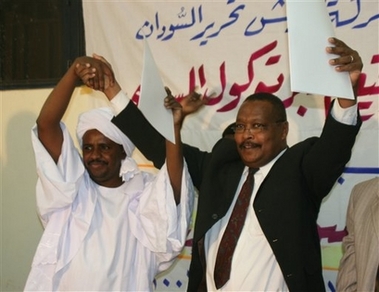Ban to press Sudan on Darfur
(AP)Updated: 2007-01-24 09:51
UNITED NATIONS - UN Secretary-General Ban Ki-moon will pressure Sudan's president next week to speed up the peace process in Darfur, which has been delayed by months of wrangling over the makeup of a larger peacekeeping force, UN officials said Tuesday.
Al-Bashir has refused to allow UN peacekeeping troops to replace the beleaguered African force in Darfur. Last month, he appeared to endorse the new UN plan that culminates with the deployment of a 22,000-strong "hybrid" AU-UN force, but Sudanese officials have since wavered on that support.
"The secretary-general is hoping to make the whole issue of Darfur move forward," his spokeswoman, Michele Montas, said at a news briefing Tuesday. "The UN plan for the AU force is still on the table and being discussed. What we will see is how fast the different stages can be implemented."
Another UN official put it more bluntly: "We want unambiguous commitment on the schedule of the deployment. ... (The Sudanese) need to give us firm dates." The official spoke on the condition of anonymity because of the sensitivity of the negotiations.
Sudan's UN mission did not return several phone calls Tuesday seeking comment.
During Ban's week-long, seven-nation trip, which starts Wednesday, he plans to attend a donor's conference in Paris on reconstruction aid for Lebanon, and visit the European Union office in Brussels and the International Court of Justice and Yugoslav war crimes tribunal in The Hague.
But Africa will be the primary focus of the trip, part of what Ban said last week would be a theme throughout his tenure as UN chief.
The secretary-general is scheduled to spend a day in Congo, where 18,000 peacekeepers are serving in the world's largest UN mission. He plans to address the National Assembly and meet with newly elected President Joseph Kabila.
He will also travel to Kenya to hold talks with President Mwai Kibaki.
The Darfur crisis, in which more than 200,000 people have been killed and 2.5 million displaced, began in February 2003 when rebels from black African tribes took up arms, complaining of decades of neglect and discrimination by Sudan's Arab-dominated government. The government is accused of unleashing Arab tribal militia known as janjaweed against civilians in a campaign of killings, rapes and arson. The government denies the allegations.
The government signed a peace agreement with one of the rebel factions in May, but violence has since worsened in the region and the conflict has spilled over into neighboring Chad and Central African Republic.
In Ethiopia, Ban will seek to bolster support for the UN security plan by asking African countries to pressure Sudan to allow the hybrid peacekeeping force into Darfur, said the UN official who spoke on condition of anonymity.
Al-Bashir agreed to the force in a letter to former UN Secretary-General Kofi Annan last month, but his country's UN ambassador has since said the force must be smaller and have no UN peacekeepers in traditional blue helmets, only African troops supported by UN technical and logistical experts.
"Sudan has jumped at every opportunity to distance itself from the agreement," the UN official said.
Ban has also reached out to China, meeting Tuesday with UN Ambassador Wang Guangya. The UN official declined to offer details of their discussions, but said, "(Wang) is the one person who could put pressure on Sudan. ... Once we have a Chinese agreement, things will move a lot faster."
China, which is one of Sudan's biggest oil customers, has resisted UN attempts to force Khartoum to accept peacekeepers. China's UN mission declined to comment on Wang's meeting with Ban.
|
||
|
||
|
|

